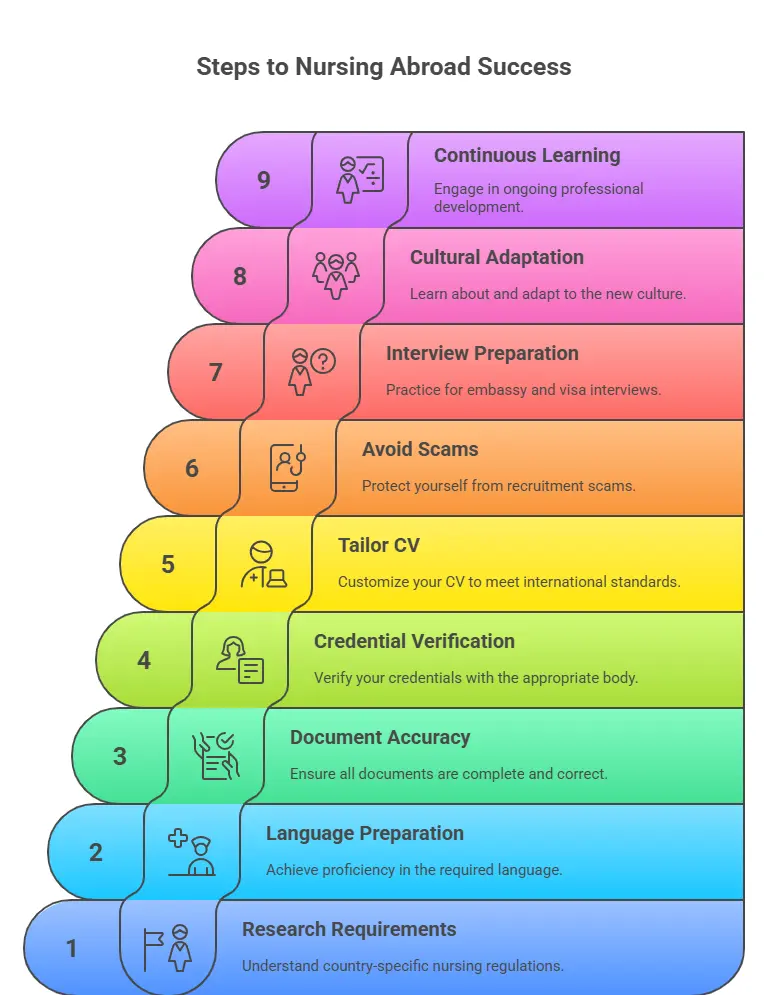Table of Contents
For many nurses, working abroad is more than just a career – this is a dream. The chances to earn a better salary, enjoy the high quality of life and gain international experience make nursing opportunities very attractive abroad. Countries around the world are actively looking for skilled health professionals, and nurses are at the top of the list.
But when the dream is clear, the journey is not always easy. Thousands of nurses apply for a job abroad each year, and many face rejection not because they lack skills or dedication but because of small, avoidable mistakes in the application process. From missing paperwork to poorly written CV, these errors can give you the opportunity to achieve the role, for which you have worked so hard.
Good news? With proper preparation, you can ignore these disadvantages and stand out because strong candidates seek employers. In this article, we let you go through nurses with 9 common mistakes while applying for jobs abroad – and how can you avoid them.
By avoiding these pitfalls, you will boost your chances of landing your dream nursing job abroad.
9 Mistakes Nurses Make When Applying for Jobs Abroad
Working as a nurse abroad is a dream for many people, but small mistakes can catch you back. From missing documents to weak preparations, these errors can often be avoided. In this guide, we will share the most common mistakes when applying jobs abroad – and some practical suggestions to overcome them. By avoiding these disadvantages, will bring you closer to getting your dream job abroad.
Mistake 1: Not Researching Country-Specific Requirements
Each country has its own nursing rules, not knowing that they can stop your application before they close. For example, Germany requires nurses to prove at least B1 or B2 levels in German, while the UK requires IELTS or OET score for English efficiency. Some countries require you to pass a license exam or complete adaptation training before practicing. Many nurses ignore these details and get confused, only to face delays, rejections or even to waste money on unnecessary applications. Not researching the needs and demands can make you look unprepared and reduce the possibility of success.
How to avoid: Visit the country’s official nursing council site before applying. Make a checklist of requirements for language, examination and documentation. This ensures that your application meets all standards from the beginning.
Mistake 2: Poor Language Preparation (IELTS, OET, German, etc.)
Language is just more than communication – this is the key to safe and effective patient care. Many nurses are unable to take language preparation seriously and believe that their basic knowledge is sufficient. But exams such as IELTS, OET or German Proficiency tests are not just about grammar; they measure your ability to handle medical conditions, patient interactions and professional conversations. Without a strong score, applications are often rejected, no matter how good your experience is. Employers and officials want to ensure that you can work safely in the healthcare system.
How to Avoid: Start preparing for your language test early. Join medical English or German courses, practice with mock tests and focus on listening and speaking skills. The goal for higher scores than the minimum requirement gives you a competitive advantage.
Mistake 3: Submitting Incomplete or Incorrect Documents
One of the most common causes of rejection of applications is incomplete or poorly organized paperwork. Missing transcripts, expired certificates, or mismatched details can delay your process immediately. Many nurses reduce the importance of accuracy, but the embassy and nursing councils are very strict with document verification. Even a minor spelling error in your name can cause unnecessary complications. Incorrect documents not only delays your application process, it can also affect your responsibility as a professional.
How to Avoid: Check each document before submission. Use a checklist to confirm that you have updated passports, transcripts, licenses and certificates. If necessary, to avoid confusion later, notarize or officially translate documents.
Mistake 4: Ignoring Credential Verification (NMC, CGFNS, ANMAC, etc.)
Credential confirmation is one of the most important stages when applying abroad. TRegulatory bodies like the UK’s NMC, the U.S. CGFNS, or Australia’s ANMAC confirmed whether your education and experiences meet their standards. Many nurses delay this process by thinking its an optional, but without confirmation you cannot continue with licensing or positioning. Since this process can take months, ignoring the cost of valuable time and opportunities. Employers expect nurses to clear their credibility before applying for nurses.
How to Avoid: First of all you should search for which credentialing body your target country uses. Start the confirmation process quickly as it may take several months. Store digital copies of all educational and hiring registers to speed things up.
Mistake 5: Applying Without Tailoring CV/ Resume for Healthcare Standards Abroad
A normal CV may work at home, but international employers hope to fulfill healthcare industry standards. Many nurses simply copy their local CV without adopting. This often leads to rejection because the leaders employed seek specific skills, such as clinical experience, patient care and medical technological skills. Using the wrong format or leaving details such as language points and certificate can weaken your application.
How to Avoid: Customize your CV for each country. Highlight nursing skills, certificates, language skills and experience that correspond to job details. Use a clear, professional format and avoid unnecessary details.
Ready to take your German skills to the next level? Get Free Demo Classes Here!
Mistake 6: Falling for Recruitment Scams
Sadly, many nurses become victims of fake job offers or recruitment scams. Scammers benefit from desperate applicants by promising quick visas or guaranteed jobs in exchange for high fees. These scams not only waste your money, but also put your career at risk. Falls for such a network often arise because nurses do not research the validity of recruitment or agencies. Genuine employers never require a great deal of pre payment for processing.
How to avoid: Always check the recruitment agency through official authorities or embassy websites. Avoid recruiters who asking for your personal bank details or huge fees. Just trust on agencies with a proven track record and transparent processes.
Mistake 7: Not Preparing for Embassy or Visa Interviews
Many nurses focus only on documents and exams, and forget that visa interviews are equally important. Poor preparation leads to misconceptions to the preparation, incomplete answers or immigration officers. Interviews often cover career goals, financial preparations and intentions abroad. If you cannot safely explain why you want to work in that country, it can doubt your application.
How to avoid: Practice the usual embassy interview questions in advance. Be clear on career goals, financial plans and job offers. Arrange all necessary documents nicely and remain calm during the interview.
Mistake 8: Overlooking Cultural Adaptation and Work Ethics
Going abroad is not just about passing the exam and getting a job – it’s also about fit in a new culture and work environment. Many nurses undervalue how important cultural adaptation is. Each country has unique ethics in the workplace, patient treatment methods and communication styles. Conflict to adapt can lead to stress, misunderstanding or even dissatisfaction. Employers are looking for candidates who can adjust to their system easily.
How to Avoid: Learn about the target country’s health culture. Participate in training sessions, connect nurses who are already working and open to new practice. Being flexible will make your progression much easier.
Mistake 9: Neglecting Continuous Learning (Specializations, Certifications)
The healthcare system is constantly evolving, and countries abroad value nurses who invest in continuous learning. Unfortunately, many nurses only seek their basic qualifications and ignore competence opportunities. This limits their opportunities because employers prefer candidates with important care in advanced skills, certificates or highly excellent areas with training, some medical or emergency nursing. Lack of professional development can make your application less competitive.
How to Avoid: Continue to update your skills through short courses, certifications or any other specilaizations. Online platforms and nursing associations offer budget-friendly programs. Highlight these achievements in your CV to show commitment to professional development.
|
German A2 Exercises – Download Free PDF |
||
Pro Tips for a Successful Nursing Application Abroad
1: How do you say "Good Morning" in German?
Applying for nursing jobs abroad can feel unbearable, but the process becomes very smooth when you are organized. A well-prepared application not only accelerates approval, but also shows employers that you are serious and professional. Before submitting your application, you can go through this checklist to avoid further delays and mistakes.
Quick Checklist for Nurses:
- ✅ Research country-specific requirements – Every country has its own nursing council and rules. For example, the UK requires registration at NMC, the U.S. uses CGFNS, and Australia requires ANMAC. Check the official sites to know what you exactly need.
- ✅ Prepare for language exams – Strong scores in IELTS, OET or German language tests are often mandatory. Start practicing early and focus on medical terminology to promote your confidence.
- ✅ Organize your documents – Make your passport, graduate certificate, transcripts, license and reference letters are updated. Keep both physical and digital copies ready.
- ✅ Begin credential verification early – This process can take months, so don’t wait. Get your education and work experience confirmed by the official body in the country.
- ✅ Tailor your CV/resume – Highlight international emergency Awareness, clinical experience, certificates and language skills.
- ✅ Beware of scams – Fake recruiters often promise to guarantee jobs or visas in exchange for high fees. Always search through agencies approved by the authorities or official hospital sites.
- ✅ Prepare for interviews – Embassy and employer interviews can determine your future. Practice general questions, review your career goals and be prepared to explain why you choose that country.
- ✅ Learn about cultural adaptation – Health services vary all over the world. Understanding work ethics, patient communication styles and cultural norms will help you adapt quickly.
- ✅ Focus on continuous learning – Certificates in areas such as critical care, emergency nursing or medical therapy makes you more competitive and increases the possibility of high demanded roles.
|
Goethe 2025 Exam Dates: Multiple Test Centers |
|
| Trivandrum Goethe Exam Dates | Kochi Goethe Exam Dates |
| Chennai Goethe Exam Dates | Coimbatore Goethe Exam Dates |
Trusted Resources for Nurses:
- Nursing councils and regulators– NMC UK, CGFNS USA, ANMAC Australia
- Language prep platforms– Official IELTS, OET, and online German language training centers
- Recruitment agencies approved by the Government- Verify the Embassy or the Ministry of Labor before they depend on an agency.
- Professional nursing community – Join the boards and social media groups where nurses share actual experiences of working abroad.
By following this tips and using reliable resources, you will feel more confident. Taking these extra steps not only prevents rejection, but additionally will increase the chances of completing a nursing career abroad without unnecessary stress.
Ready to take your German skills to the next level? Get Free Demo Classes Here!
Free German A1 Mock Tests – Powered by AI!
Test your skills on our interactive platform. Get instant feedback from our AI to help you communicate better and track your progress. Start your free German mock test now.
Test Your German A1 for FreeConclusion
Nurses planning to work abroad can avoid normal errors with proper preparation. Starting early is the important part-completing all necessary documents, certifications and research on your destination country. Being well-prepared helps you navigate the application process easily and increases your chances of getting the desired job quickly.
Language skills are equally important for patient care and team communication. Achievable language learning program can promote self-confidence and make daily work easier. In addition, consultation-verified nursing migration agencies ensure that you receive accurate guidance and avoid scams. By preparing yourself quickly, improving your language skills and taking expert advice, you can make your dream of working abroad a successful and rewarding career.
Free German A1 Mock Tests – Powered by AI!
Test your skills on our interactive platform. Get instant feedback from our AI to help you communicate better and track your progress. Start your free German mock test now.
Test Your German A1 for FreeFrequently Asked Questions
What are the requirements for nurses to work abroad?
To work as a nurse overseas, you generally need a valid nursing license from your home country, relevant work experience, and proficiency in the local language. Some countries also require passing a competency exam or obtaining registration with the country’s nursing council. Preparing early and understanding each country’s specific requirements is crucial for a smooth application process.
Do I need IELTS or OET for nursing jobs in Germany, UK, or other countries?
Yes, most countries require proof of English language proficiency. The UK usually requires IELTS, while Australia and New Zealand accept both IELTS and OET. Germany often requires German language certification (like B2). Choosing the right language test and training in advance helps you meet eligibility and improves your chances of securing a job.
How can nurses avoid job scams abroad?
Always consult verified recruitment agencies or government-recognized migration programs. Avoid agencies that ask for large upfront fees or make unrealistic promises. Cross-check job offers, verify employers, and follow official guidelines to ensure a safe and legitimate recruitment process.
Which countries are easiest for nurses to migrate to?
Countries like Canada, Australia, New Zealand, the UK, and Germany are popular among nurses due to high demand and clear migration pathways. Each country has its own visa, language, and licensing requirements, so researching early and preparing accordingly makes the process easier.
What documents do nurses need to apply overseas?
Common documents include your nursing license, educational certificates, work experience letters, passport, language test scores, and health clearance. Some countries may also require a police clearance certificate or proof of financial stability. Organizing these documents in advance helps avoid delays during application.
How long does it take for a nurse to secure a job abroad?
The timeline varies by country and visa type. On average, it can take 6–12 months, including language tests, document verification, licensing exams, and job placement. Early preparation and guidance from verified recruiters can significantly shorten this process.













